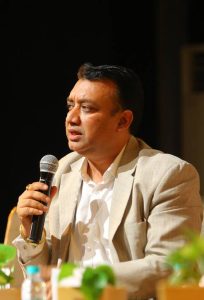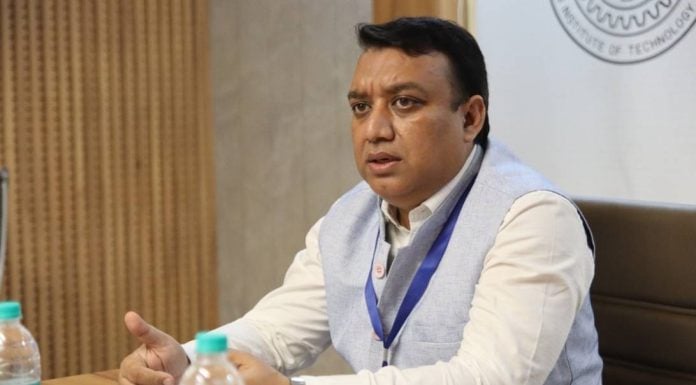Over the years, the startup ecosystem in India has displayed notable growth, with enterprises like Zomato and Paytm progressing from small initiatives to significant players in their sectors. Dr. Nikhil Agarwal, CEO, SIIC and FIRST & AIIDE, IIT Kanpur said these developments are signs of a maturing startup ecosystem in the country.
In an exclusive interview with TechObserver.in's Shalini Shukla, Dr. Agarwal deliberated on the role of collaboration among academia, government, and the private sector in supporting this growth.
“What's unique about India is its vast consumer base, diverse sectors ready for disruption, and a young, tech-savvy population. For international investors, this offers a plethora of opportunities, be it in fintech, healthtech, agritech, or e-commerce,” Dr. Agarwal said, adding that “simplifying the compliance process, creating more sector-specific incubators, and increasing the availability of early-stage funding can further amplify the growth.”
Edited Excerpts:
Could you share your insights on how the startup ecosystem has matured over the last few years, and what unique opportunities India presents to both domestic and international investors?
Over the past few years, India's startup ecosystem has undergone a remarkable transformation. From being nascent, we have now moved to a mature ecosystem characterised by a mix of early-stage startups, unicorns, and successful exit stories. Two examples that come to mind are Zomato and Paytm, which started as small initiatives but have become giants in their respective sectors, showing the potential that the Indian market holds.
What's unique about India is its vast consumer base, diverse sectors ready for disruption, and a young, tech-savvy population. For international investors, this offers a plethora of opportunities, be it in fintech, healthtech, agritech, or e-commerce.
Collaboration between academia, government, and the private sector is often cited as a cornerstone for a thriving startup ecosystem. Could you elaborate on some successful collaborations you have witnessed or facilitated through SIIC and AIIDE?
SIIC and AIIDE have always believed in the power of collaboration. One instance is our partnership with the Department of Science and Technology to facilitate tech-driven innovations. Another collaboration is with local industries, where our researchers, with real-world industry challenges in mind, develop scalable solutions. These partnerships not only provide a platform for our budding entrepreneurs but also drive academia to produce industry-ready solutions.
How do you perceive the policy landscape shaping the growth trajectory of startups in India, and are there any additional measures you believe could further accelerate this growth?
Also Read | Indo-Korean startup ecosystems eye greater collaboration at IIT Kanpur workshop
The Startup India campaign and other such initiatives have given a significant boost to the ecosystem. The policy landscape, by offering tax breaks, funding opportunities, and easing regulatory norms, has been conducive. However, I believe there's always room for improvement. Simplifying the compliance process, creating more sector-specific incubators, and increasing the availability of early-stage funding can further amplify the growth.
Despite the strengthening startup ecosystem, challenges like access to funding, regulatory hurdles, and talent acquisition persist. How SIIC and AIIDE are aiding startups to navigate these challenges and what more can be done at a systemic level to alleviate them?
At SIIC and AIIDE, we offer mentorship programmes, connect startups with potential investors, and even assist with regulatory compliances. Talent acquisition, however, remains a challenge. One way we're addressing this is by promoting entrepreneurship as a viable career option right from the college level. Systemically, a more integrated approach between academia, industry, and the government could streamline the process for startups.
Looking ahead, what are some emerging sectors you foresee as being ready for disruption by startups in India?
The sectors I see as ready for disruption include healthcare, with telemedicine and AI-driven diagnostics; agritech, considering India's vast agricultural landscape; and edtech, given the digital shift in education. Additionally, sustainable energy and green technologies are fields where a lot of innovative work can be done.
Defence collaboration appears to be a significant focus. How does IIT Kanpur plans to foster bilateral defence innovation programmes?


Defence is indeed crucial. Our approach involves establishing partnerships with international universities and defence organisations. This not only brings in expertise but also facilitates exchange programmes, joint research initiatives, and more. We're also focusing on developing indigenous technologies that can cater to our country's specific defence needs.
We run the iDex programme of the Ministry of Defence where we have incubated around 15 companies. These companies are now working on developing cutting edge technologies that would make our country safer.
With different responsibilities across SIIC and AIIDE, how do you manage to maintain a strategic focus and ensure continuous innovation across these different domains?
It's all about creating synergies. Both SIIC and AIIDE, while having distinct objectives, operate under the broader goal of fostering innovation and entrepreneurship. By ensuring cross-collaboration, sharing resources, and maintaining open channels of communication, we can drive continuous innovation while staying strategically aligned.











